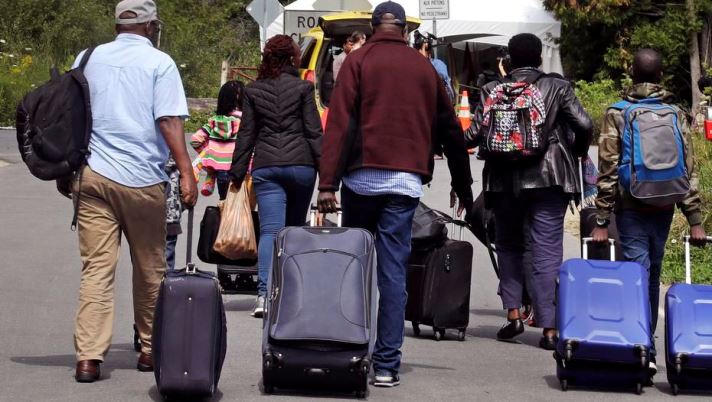Recently, 123 Nigerian migrants were deported from war-torn Libya, thanks to the intervention of the International Organisation for Migration (IOM) which, in collaboration with the federal government, facilitated the return of these Nigerians to the country. Most of these deportees have been languishing in detention facilities in Libya after their attempts to illegally travel to Europe were truncated.
The intervention was crucial in saving the lives of these Nigerian migrants who face not only the risk of slavery and human trafficking in Libya, but the real possibility of violent crimes and death in the Sahara and drowning in the Mediterranean Sea in dangerous crossings to get to Europe.
We are gravely concerned by the migration crisis that Nigeria is facing today. This crisis has got so bad that one of the first motions moved at the 10th House of Representatives was on the ‘Need to Declare Emigration of Young Nigerians Abroad a.k.a Japa Syndrome a National Emergency.’ Representative Philip Agbese (APC, Benue), who moved the motion, asked the federal government to “convene a national summit with key stakeholders to effectively address the Japa syndrome.”
While the motion was rejected based on the fact that it infringes on the fundamental rights to movement, it would not be the first time these concerns have been raised in the National Assembly. During the 9th Assembly, Rep. Ganiyu Johnson (APC, Lagos) proposed a bill that would essentially stop the migration of Nigeria-trained medical professionals until at least after five years of practice in the country. That motion was designed to regulate the mass migration of medical professionals abroad.
- Immigration promotes 7000 personnel, redeploys 12 comptrollers
- Bayelsa dep gov hosts banquet for Muslims
A recent report titled ‘A New World Order: Shifting Paradigms in Addressing Brain Drain’, presented at the Nigerian Human Resources Directors Network in Lagos by a talent management firm, Phillips Consulting (PCL), suggests that surveys have indicated that 52 per cent of Nigerian professionals are considering quitting their jobs and relocating abroad within a year.
The menace is not limited to professionals alone, as data from the UN Office of Drugs and Crimes (UNODC) shows that 75 per cent of Nigerian migrants plan to use smugglers and traffickers for overland journeys, mostly to Europe. Most of these migrants will pay an average of around $610 US for the services, excluding food and bribes. A good number of those migrants don’t make it to Europe as they either end up dead in the desert, captured by Libyan slavers, detained by authorities in North African countries, drowned at sea or arrested, detained and repatriated from Europe.
Yet the scourge of regular and irregular migration is so pre-imminent as both professionals and artisans are taking every opportunity to leave the country for greener pastures elsewhere, especially to the US, Canada and UK. As of June 2022, Nigerian migrants constituted the third largest nationality in the UK, according to a report published by the UK Home Office.
The report places Nigerians as the largest migrant population to the UK at the time of the study, with figures rising by some 686 per cent from 2019.
While the federal government cannot infringe on people’s right to movement, it must insist that such movements and migrations are done through legal channels. That would mean cracking down on illegal migrations, human traffickers and smugglers, ensuring tighter border controls, especially along illegal routes and arresting and prosecuting the criminal facilitators of such crimes.
The federal government must be concerned not only about the brain drain which is depriving the country of much-needed manpower and the intellectual capacity to build and develop the country, but also about the safety and well-being of its citizens desperate to flee the country. This would mean addressing the root causes of this desperate migration that include insecurity, low employment rates, high poverty figures and lack of basic infrastructure and opportunities.
Most of the migrants are young Nigerians. Data by the National Bureau of Statistics (NBS) show that 53.4 per cent of young people are unemployed while the World Poverty Clock estimates that 86 million Nigerians live below the poverty line. Therefore, curtailing these migrations must go beyond shutting down the borders and cracking down on illegal migration operators and addressing some of these root causes.
While we point to the reputational damage the country suffers from these migrations, we believe that regular or irregular migration is expensive and Nigerian migrants take far more out of the country in terms of financial and intellectual capital than they pour back in.
We, therefore, urge the government to as a matter of urgency come up with a comprehensive plan to address the root causes of migrations, crack down on irregular migrations and streamline regular migrations. The reputational damage to the country must be checked but above all, the dignity of Nigerians and the sanctity of their lives during these dangerous crossings must supersede every other consideration. The time to act is now.

 Join Daily Trust WhatsApp Community For Quick Access To News and Happenings Around You.
Join Daily Trust WhatsApp Community For Quick Access To News and Happenings Around You.


